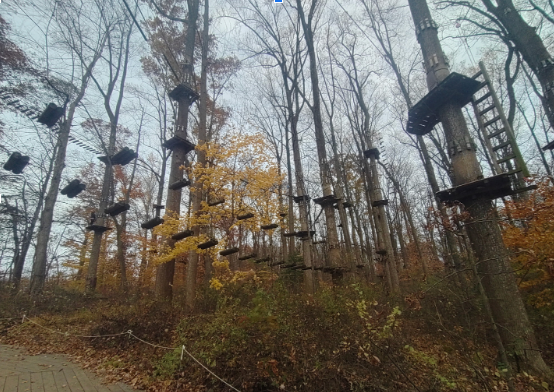Winter Play Returns with Disco-Infused “Romeo & Juliet”
- Teagan Lynch & Ava Orfield-Shah
- Dec 26, 2023
- 3 min read

Scenes from Romeo & Juliet in the Commons Experimental Space / Credits: Teagan Lynch
Each year, School Without Walls performs a winter play and spring musical. This year’s winter play was the classic “Romeo & Juliet,” written by William Shakespeare. The five act show was performed in the commons “experimental space” at the beginning of this month. “Romeo & Juliet'' is a tragedy about love, miscommunication, and family conflicts. Walls’ production of the well-known tragedy reimagines the story of star-crossed lovers against a 1970s backdrop, complete with disco balls and ‘70s dance hits.
The cast worked hard for months to prepare for the performance, studying lines and their characters whenever possible. Maizie Klevan (‘27) who played Juliet’s cousin, Tybalt, said, “[I had to] memorize my lines, memorize my blocking, do my acting work.” This work involves finding “your objectives and tactics for your character. You have to find their motivation, what is important to them, how that relates to the play, and what makes them do what they do.”
Phoebe Sabar (‘26), playing Juliet, described studying her lines as a nonstop task: “Memorizing constantly! On the train, during class, at home.”
The cast members also had rehearsals every day. Despite all the work, the actors still enjoyed putting together scenes. Sabar explained, “we do get a lot of work done, but people are also very giggly and having fun, you know, it’s a good vibe.”
For many performers, acting has also helped them in life off the stage. Patrick Carey (‘24), who played Capulet, said, “it’s great for public speaking and confidence.”
Chamiya Carnathan (‘24), who starred as Romeo, agreed that acting has helped her confidence, adding that it was her first time acting.
School Without Walls’ performance, while based on William Shakespeare’s “Romeo & Juliet,” was not identical to the original. Klevan explained, “it’s set in the ‘70s, and they’re using switch blades instead of swords. And, you always cut Shakespeare a little bit.”
Sabar described it as an abridged version of the show set in the 70s. Incorporated in this version of the play is a party scene, including 1970s music and a few dances of the 2000s. The actors will also wear 70s attire remaining from previous shows.
The backbone of any play is its director. For “Romeo & Juliet,” that was drama teacher Lea Zaslavsky — Ms. Z. She assisted the actors by helping them fully understand their characters.
“We talk a lot about what their character wants, what their character’s motivations are, what they want from the other characters in the scene, what they want for their future. I have students work from there and try to figure out how to embody that character, ” said Ms. Z.
In addition to the director, stage managers are vital to keeping a production running smoothly. Sarah Rice (‘24), an intern for Ms. Z, was the stage manager for “Romeo & Juliet,” and worked constantly to maintain the steady progress of rehearsals. “I pretty much just help her make sure that everything goes the way that it needs to go. I was involved in casting, both in running auditions and helping her with some of the decisions that we made for the final cast,” said Rice.
Actors worked since late September to build their characters, and by extension, their play. Throughout many challenges, they persevered and found solutions.
As a whole, the play “went very well,” according to Phoebe Saber (‘25) who played Juliet. “I even heard that I made someone in the audience cry,” she said, “which was like the best compliment ever.” Rice said that the play “turned out to be one of the most rewarding experiences ever” and it helped to “rekindle [her] love for theater.”
From start to finish, everyone involved in the play has fulfilled their vital role in the development of “Romeo & Juliet.” Shakespeare fan or not, all kinds of audiences were enthralled by this performance!







